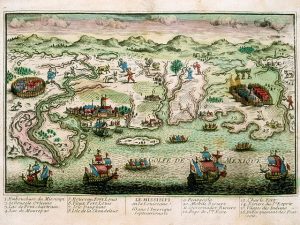This year New Orleans is celebrating its tricentennial,, opens a new window and the city is celebrating all year long. We here at the St. Tammany Parish Library have been spotlighting the city's history with our Celebrating the Tricentennial blog posts each month. If you've missed one, you can read them all here, opens a new window.
The land on which New Orleans sits was originally used by the Native Americans as a route between Lake Pontchartrain (and on to the Gulf) and the Mississippi River. As early as 1699 on his first trip down the Mississippi River, Bienville, opens a new window thought the "beautiful crescent," the land that we today know as the Frech Quarter, was the ideal spot for the city. In 1717 Crozat gave up his charter to the Louisiana territory and the colony was transferred to the Company of the West, the president of which was John Law, opens a new window—a Scotsman and the inventor of inflation, who had the confidence of the Duc d'Orleans. He created a scheme to induce noblemen and rich businessmen to buy stock in Louisiana and purchase lands, and then to entice the poor of Europe to come as hired hands. Law and his architects wanted to build the colony capital and headquarters in what is now Baton Rouge, but Bienville prevailed. He wrote in his diary in June 1718:
We are working at New Orleans with as much zeal as the shortage of working men will allow. I have myself conveyed over the spot to select the place where it will be best to locate the settlement. ... All the ground of the site, except the borders, which are drowned by floods, are very good and everything will grow there.
Though the exact date of the founding is unknown, the city "traditionally" celebrates its anniversary on May 7, opens a new window. According to geographer Richard Campanella, opens a new window, there is no archival evidence of when the clearing of vegetation began to establish the city of New Orleans, but rumor suggests that it occurred on May 7, 1718. However, existing evidence points to nothing more specific than late March or early April. It was during New Orleans's last major anniversary in 1968 that there was a push to establish a "true" date of the city's founding. They selected April 16, the birthday of His Excellency Charles Lucet, French Ambassador to the United States and guest of honor at the city’s lavish anniversary banquet, which was held on May 7, 1968. Campanella suggests that the persistence of May 7 as the city's anniversary may be the result of someone who found a commemorative program from the banquet and just assumed that was the city's birthday.
Check back next month when we will talk about the first plan for the city, which created its distinctive grid.
If you are interested in the origins of New Orleans, and the original settlement in the French Quarter, you might want to visit the Historic New Orleans Collection's exhibit New Orleans, The Founding Era, opens a new window. Or check out the list of titles below that highlight the history of the quarter:




Add a comment to: Celebrating the Tricentennial: Founding of New Orleans